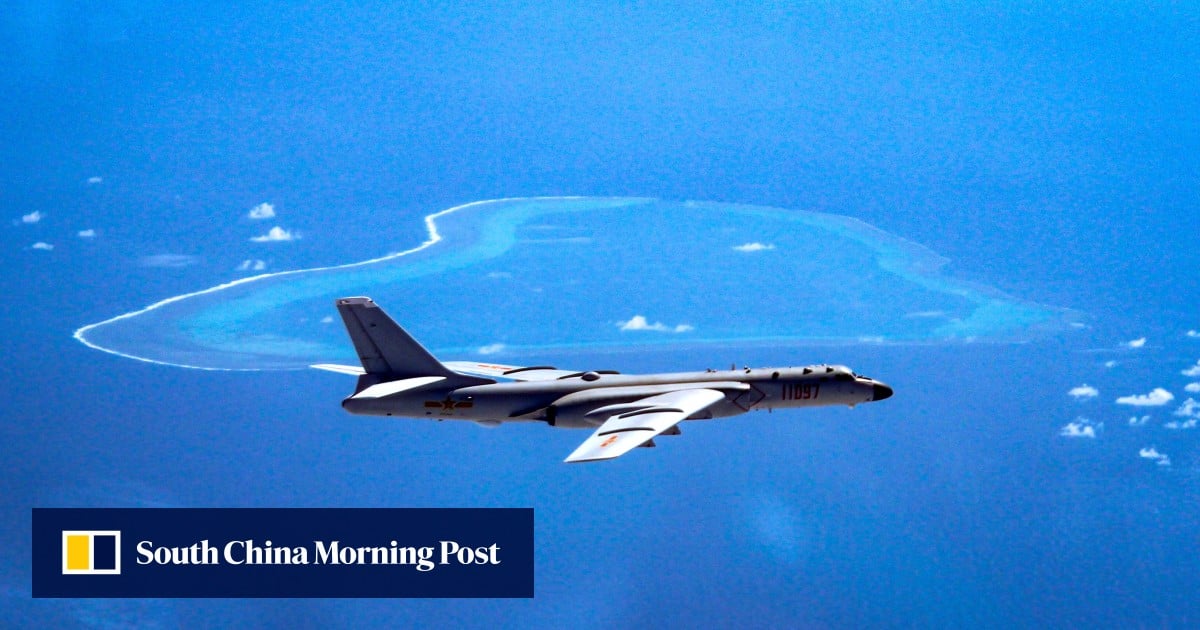Headline: China Escalates Sea and Air Patrols Near Disputed Shoal
In a notable intensification of maritime tensions, China has recently conducted extensive sea and air patrols around a disputed shoal, a move that the Philippines perceives as an aggressive assertion of territorial claims in the South China Sea. As the geopolitical landscape shifts, this development has sparked significant concern for the affected nations and regional stability.
Escalation of Tensions
The patrols, which took place around the Scarborough Shoal—an area within the Philippines’ Exclusive Economic Zone (EEZ)—have drawn sharp criticism from Manila. The Philippine government has accused China of attempting to push it to abandon its claims in the strategic waterway, known for its rich marine resources and vital shipping lanes.
According to the South China Morning Post, the increased Chinese military activity is accompanied by Beijing’s recent proclamation of new baselines around the shoal. This includes drawing lines that reinforce claims over the area, a change that Manila says undermines its sovereign rights and poses a threat to regional security.
Who is Involved?
The dispute primarily involves China and the Philippines, although other Southeast Asian nations also assert claims in the South China Sea. China’s assertiveness in recent years has led to heightened tensions not only with the Philippines but also with Vietnam, Malaysia, and Brunei. Regional powers and multinational organizations have increasingly urged for resolutions to these disputes, often emphasizing diplomatic negotiation.
Expert analysts highlight how China’s approach involves a combination of military posturing and legal maneuvers. "By increasing its naval presence and making legal claims, China is not just staking a maritime claim but is also trying to shift the narrative in its favor," stated a maritime security expert at an international think tank.
Why This Matters
The significance of this development goes beyond the immediate military or territorial implications. The South China Sea is crucial for global trade, with a substantial portion of the world’s maritime traffic passing through these waters. Any instability in this region impacts not only Southeast Asian nations but also global shipping lanes and economic interests.
Moreover, the heightened presence of Chinese forces affects local fishing communities in the Philippines. Fishermen have reported difficulties accessing traditional fishing grounds due to increasing Chinese naval activities, further escalating local tensions. The Philippine government is called to balance the need for defending its territorial rights while ensuring the livelihoods of its fishermen.
Legislative Response in the Philippines
In response to these aggressive maneuvers, the Philippines has enacted several new laws concerning its maritime jurisdiction. Recent legislation aims to fortify the nation’s stance on its territorial claims and enhance defense capabilities in response to perceived threats from China.
Philippine officials have reiterated their commitment to protecting their sovereignty. "We will not cede our rights in the South China Sea. Our government is firmly committed to standing up against economic coercion," stated a high-ranking official from the Department of Foreign Affairs.
The new laws are expected to include increased funding for the Philippine Coast Guard and the enhancement of naval resources to ensure a stronger defensive posture in the contested waters.
The Way Forward
As this contentious scenario continues to unfold, it remains to be seen how the Philippines will navigate its diplomatic relationships with China while reinforcing its national interests. Regional analysts and international observers suggest that multilateral dialogues may be key in diffusing tensions.
Both nations have previously engaged in dialogues facilitated by the Association of Southeast Asian Nations (ASEAN). However, frequent disruptions and conflicting agendas have hampered progress.
Expert Opinions
"The situation demands a careful diplomatic approach from the Philippines," says Dr. Eloisa Rivera, an expert in Southeast Asian geopolitics. "They must strengthen alliances not just with neighboring countries but also with global powers like the USA and Japan to counterbalance China’s influence."
Furthermore, it is essential for the Philippines to diversify its partnerships and explore collaborative resource management in the South China Sea regions that do not directly escalate tensions with China.
As the situation evolves, political analysts are closely monitoring developments, believing that increased international attention can lead to greater accountability and dialogue between the countries involved.
Call to Action
The international community must remain vigilant regarding the South China Sea situation. Interested parties are encouraged to explore further material, including this article on ASEAN’s role and recent laws enacted in the Philippines.
Readers are invited to share their thoughts on the ongoing situation. What direction do you think the Philippines should take in responding to China’s actions? Join the conversation in the comments below!


